What Will Happen to Hannah in 'The Handmaid's Tale'?
Warning: This post contains spoilers for 'The Handmaid's Tale' season five episode eight, 'Motherland' and Margaret Atwood's novel The Testaments.
Blessed be the Fruit Loops!
Margaret Atwood mastered the art of description decades ago. Using the five senses, metaphors, and monologues, she transports us into the minds of her characters, while bringing intangible thoughts and feelings to life. When Hulu decided to adapt her books into a television series, they developed their own toolkit, and borrowed some of her techniques, hoping to reproduce that effect. They used facial expressions, pauses between words, and camera tricks, and they created a fully immersive narrative--one that could almost convince us that we were in June's position, moving back and forth, staring up at the ceiling, while Fred performed the ceremony, confined to her room, slowly going mad. We felt every single thing she felt, and we absorbed every second of it, almost to the point where we couldn't take it anymore. Many fans had to leave the series behind, simply because it was too difficult to watch. They loved it, but walking in June's shoes was torture.
During that torment, one thing kept her alive and sane: her daughter Hannah. June believed that if she could just find Hannah and rescue her, everything would be OK. She'd spend hours dreaming about their trip to the aquarium--jellyfish swimming through the water--and the morning they made pancakes with chocolate chips, and she held on to that, using it to get her through, even as she was enslaved, beaten, and violated.
When the pain is just too much, all hope is lost and your world becomes tainted by something as horrific as Gilead, you need a reason to live. Without that, you'll just throw yourself over a cliff; you'll say something wrong or act out, and you'll be killed or sent to the colonies. In an environment that strict, obedience has to be bearable, and Hannah made it bearable.
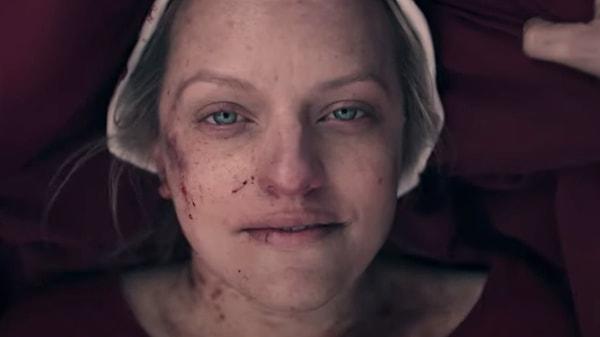
Courtesy of Hulu
Lace and Lavender
The promise of Hannah is the promise of inner peace, but it's not real. Trauma leaves an indelible mark on the brain, like the scent of Fred's cologne, or the way he'd nibble on June's neck at Jezebels. Those images have become a part of June, and the proof is there in front of us. She has flashbacks, moments when she thinks she's back in Gilead. She experiences unbearable restlessness and obsessive thoughts. She can't let it go, no matter hard she struggles against it; she is shackled to that world. She will never leave it behind.
Hannah would not be at peace in Canada, either. In season four, when June was taken to prison for interrogation, they placed Hannah in a glass case to coerce June into giving away the location of the escaped handmaids. When Hannah saw her mother, she shrank back in fear, and June realized that Hannah didn't recognize her at all. They had broken the bond between mother and daughter, and June would have to work against that if they were reunited, just like the children on Angel's Flight. It would take time. There would be resentment and pain. Hannah would hate her mother for removing her from the only home she remembered.
Children do have fond memories of the places they grow up, and Hannah was raised in what would seem like a good home. The MacKenzies were privileged, even more so than the Waterfords. The Commander was higher in rank. She would have received the best of the best, and her adopted mother was a kind soul who did in fact care about her wellbeing. She even cared about June's wellbeing, and she made that clear on two separate occasions. How could Hannah not love the woman? She is by all accounts decent. With June, things would be more complicated. June is a fighter. She's also mentally ill, wounded by the things she's seen and experienced. It's etched into the lines on her face, the dark circles under her eyes, and her tone of voice. She would frighten Hannah.

Courtesy of Hulu
We have to consider what would happen to a 12-year-old who was shocked and effectively kidnapped from the only home she loved. She'd be placed in an unfamiliar environment, one where emotions were running high, robbed of her former faith and the structure she was used to. The truth would be shoved down her throat, and like any adolescent, she'd reject it. She'd be scared, angry, and confused, and the promise of perdition would be hanging over her shoulder. We've seen this with some of the kids who were on Angel's Flight, but not how it would play out over time. Freedom would be Hannah's worst enemy. June would warn her about the dangers of the world, and all of the mischief she could get up to in a place like Canada, and Hannah would rebel. Her hormones would be raging. Puberty would rear its ugly head, and she'd experience urges--an attraction to boys, a need to do something, anything to piss off her 'new' parents. It's likely that she'd go bad and turn to drugs and promiscuity. She might even run away and find herself on the streets, trafficked and addicted.
Ex-cult members and children raised in pious families are known for falling into addiction. They're kids that can't get enough of the forbidden fruit. Ex-FLDS teens, for example, will often turn to hard drugs. They can be found living in flop houses--no furniture, needles everywhere, pipes, trash, and tin foil scattered across the ground. These are usually young men and boys who were abandoned and forced into a world they were unequipped to face, just like Hannah. Without any direction, and an angry outlook, she could easily go down that path. She needs to let her mind and heart settle and develop, or things won't turn out well.
That's the only way Hannah will have a healthy relationship with June. If Hannah is pulled out early, June's greatest frustration will be her inability to connect with her daughter. It would make her symptoms worse. Hannah would go from being a symbol of inner peace in her life to a constant reminder of what Gilead did to her family. There's no grief quite like that of a mother powerless to reach her child, especially since June would understand exactly what was happening to her and where it stemmed from--her worst enemy, Gilead and its propaganda machine. She would see the pathology, and all of their evil, and she would know what Hannah was going through, but Hannah would never listen. She'd miss the aunts who taught her, her friends in school, and the marthas who took care of her, and she'd have to live with the knowledge that she was never going back--all thanks to a stranger claiming to be her mom. It's twisted and unthinkable, but Hannah is part of an entire generation that developed an emotional attachment to a theocratic dictatorship.
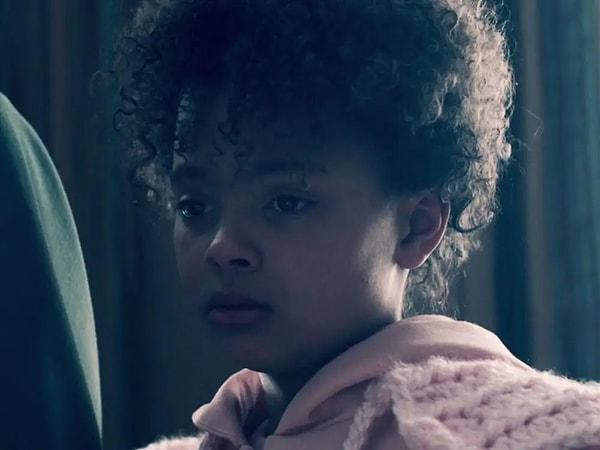
Courtesy of Hulu
Covert Ops
Luke escaped a country that looked very much like our own. He watched most of the war from television and phone screens, dreaming of revolution, and pining after his lost wife. That's where he heard about marthas, commanders, and the ceremony, and for a very long time, he didn't know if June was alive or dead. Gilead was almost completely cut off from the rest of the world. They shut down their borders, save for vital trade, and acted in secret. The United States was just as uninformed as everyone else. They didn't even know who was ruling the country, and they certainly couldn't track the whereabouts of their former citizens. That information belonged to commanders and aunts.
Luke didn't give up. In fact, he was more perseverant than most. He'd troll the halls of the embassy, questioning anyone that would give him the time of day, gathering as much information as he could. They'd roll their eyes and run when they saw him. There weren't a lot of resources. The United States bombed the Southwest in an attempt to keep Gilead from becoming a nuclear power, and then they stepped away to lick their wounds. Every time he turned to them, they said they couldn't help.
He felt powerless. After years of hunting for June, begging God to help her, he realized that his government was gone. Bitter and angry, unable to cope with the loss of his wife, he did what he could to dull his senses. He stocked up on liquor like most homes stock up on milk and eggs, and it made things worse. Alcohol is a depressant. It sends people into a downward spiral, stuck in their insecurities, their worries, and their pain, forcing them to drink to make it all go away. The effect snowballs as the addiction grows, bringing with it cravings, and even more mental health issues--coupled with the knowledge that his wife was a slave. He knew that she wasn't alright, and it was emasculating for him, knowing that he couldn't help her. He saw himself as weak--a half-man, too much of a coward to do what needed to be done. It was humiliating, and it destroyed his confidence.
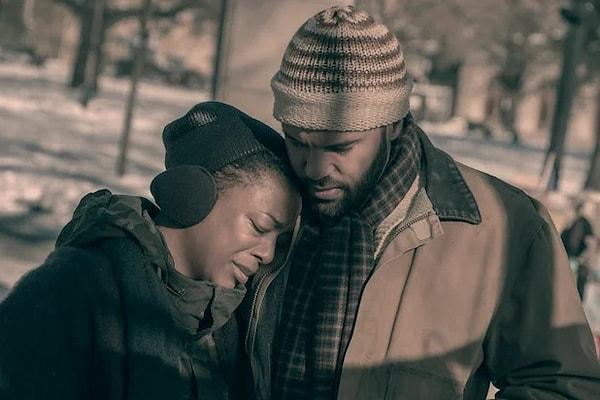
Courtesy of Hulu
Luke continued to press the government, knowing that they were a failing force, eclipsed by the strength of the new nation. He asked them for help when Commander Waterford showed up for a state visit. They told him that there were protests planned, and they encouraged him to attend. When June was imprisoned in season four, he asked them to get her out, and they told him--of all things--to bury a persimmon in the backyard for good luck. This continued when June was finally smuggled across the border and the Waterfords were locked up for crimes against humanity. They relied on Tuello to ensure that Fred was convicted.
Fred was being charged with slavery, and they chose to give him a plea deal instead. The Americans sent Tuello to coddle Serena, take her to Gilead to bury Fred's body, and they even gave her the option to accept refugee assistance. This is a woman who was accused of having her slave violated, and they did more for her than their own people. Meanwhile, Hannah was still in Gilead. She was nearing puberty, and the best they could get from Mr. Tuello was a quick phone call to Commander Lawrence and a visit with Nick. They couldn't even confirm her location.
What was left of the United States was a skeletal shell. After the holocaust and Gilead's takeover, they were left with all of two states--Alaska and Hawaii--and only a handful of disputed territories, which they were losing.

Courtesy of Hulu
Much of the information that the United States had on Gilead seemed to be coming from resistance forces, like Mayday and the marthas. It was distorted, unreliable, and it passed through multiple channels before it reaches the border. They should've had black ops, networks of spies, and people acting on their behalf on all levels of Gilead society, blowing up buildings and poisoning commanders. But they were so diminished that they had to rely on the few slaves willing to act against Gilead. There was no faith, no patriotism, and no love for what was lost, just an overwhelming sentiment that America was dead. Even mayday seemed more capable of making a difference, and they were working out of shacks in the woods.
There was no smuggling infrastructure--nothing, not even funding for an underground railroad. If they couldn't even get a spy across the border or pull off a few bombings of their own, how were they supposed to raid a wife school, drag Hannah out, and safely get her to June?
It should come as no surprise to anyone that Tuello's attempt to rescue Hannah will fail, but it is probably for the best. Neither June nor Hannah would find peace in that situation.

Courtesy of Hulu
Hannah's Tale
Growing up in Gilead was very confusing, especially for young women. They received a lot of mixed messages. They were told from an early age that they were precious flowers, delicate and beautiful. They had to keep their legs, hair, and arms covered--skirts never more than two inches above the ankles. A single curl fallen out of place could be enough to enflame the desires of men, and it would be their fault for allowing it. There was something tempting about them, something secret. They were not sure what, and they were never really told--not until they were getting ready for their wedding night. They were just warned off, so the girls would walk around, terrified of anyone with a penis, and the environment they were in didn't make things any better. They were herded by guardians with guns, bossed around by their fathers, and ogled by passersby with roaming eyes, starving to spoil their petals.
At the same time, they were told that they were being bred for a higher purpose. One day they would have husbands, and they would feel differently about men. Some, like Hannah, felt exploited, like walking holes, shamed away from the very purpose they were bred to perform. They were terrified of their mysterious duty, and everyone around them seemed to want to rush things, end their childhood, destroy their innocence, and force them out. That type of upbringing doesn't make young women feel differently about men. The constant warnings about sex stuck, so when it was time to marry--which usually happened around 12-14 years old, they were terrified.
They grew up in a world surrounded by hungry beasts, and they knew themselves to be lesser creatures--always held accountable and never to be believed. That dynamic would carry over into marriage, and it made some men feel empowered to do things that they shouldn't to girls who were far too young. That is what happened to Hannah. She had an unsavory visit at a dentist's office, and she was left confused by what occurred. She eventually came to see herself as breeding stock, being made ready to be used by others her entire life, like a doll kept on a shelf.
Hannah was right to feel that way. Wifehood is a form of slavery. They were worked, beaten, and imprisoned. A wife who tried to leave her husband would be subjected to Gilead's special brand of justice, and that servitude began early. There were only two ways to escape it: either their death or that of their husbands. We later learn that husbands would often frame their wives when they got older, and some would outright kill them, hoping to marry someone prettier and younger instead. This was just one of the many crimes that occurred in Gilead's marriages, and though the girls were not fully aware of what went on, they knew enough to be scared of what was coming next.
With Hannah, there were no hysterics. Her inner strength is a hallmark of her character, and it appears to have come from Gilead--one of several benefits of growing up there. She'd been told for most of her life to stay quiet, keep her head down, and not to make a fuss of things, like a child that won't sit still church, and those lessons carried over, eventually integrating themselves into her personality.
She didn't make a fuss of things. But there was angst, the desire for something more, and these feelings came to a header during the time period that we see her in the series. She didn't want to get married, and neither did her friend Becka, the dentist's daughter, who Hannah believed to have had a similar experience. One day, Becka decided to use a pair of sheers to hurt herself while they were in wife school. From this incident, we learn that the girls often experience a phobia. They dreaded phallic objects, things like bananas, knitting needles, or pencils. The thought of them could bring on panic attacks, and even suicidal ideation. Gilead's attitudes towards sex and marriage were so toxic it was creating a mental illness. Hannah experienced something similar, and she thought about killing herself many times, especially when her engagement was announced. She probably would have made an attempt had Lydia not intervened. She blackmailed Hannah's stepmother, Paula, into allowing Hannah to become an aunt.
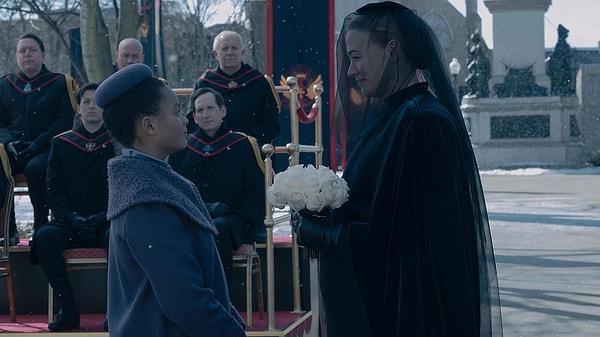
Courtesy of Hulu
Deprogramming
Hannah had an identity crisis early on in life. One of the girls in her school, who had been given the unfortunate name Shunnamite, told her that her mother, Tabitha, wasn't really her mother. The girls were ignorant in all things, from the nature of the time before, to handmaids, adoption--and anything else substantial, really. They were unspoiled youth, kept innocent until their wedding. Shunnamite had overheard a conversation and passed the information along. She wasn't supposed to know anything. In fact, Tabitha had made up an intricate story to explain where Hannah had come from. She told Hannah that she went walking through a forest and came upon a castle. She used her magic ring to open the castle, and she stole Hannah away from wicked witches.
There was some truth to this story. Tabitha's magic ring was her wedding ring, and because she was a wife she was allowed to choose one child to adopt, so she chose Hannah. She said that they had to run through the forest and hide in a hollow tree to get away. This is peculiar because Hannah did have a memory of running through the forest with someone. She didn't remember her real mother at all, but there were flashes in her mind, things she couldn't explain. Nichole would describe a smell, like the memory of a voice you couldn't quite hear.
Hannah developed an image of her real mother, something she held on to in the same way that June held on to her memories of making pancakes and visiting the aquarium. It was a way for Hannah to get past a lot of the pain she experienced, especially when Tabitha died, and her stepmother Paula came into the house. Paula hated her. She treated her like an angsty teenager, and she plotted to get rid of her as soon as she could. Hannah also came to find out that her mother was a handmaid. She didn't understand much about how that worked, but when Paula's handmaid came into the home, and she saw how strange the woman was, it made her curious.

Courtesy of Hulu
Paula's handmaid Ofkyle seemed upset all the time; they all did, and they had a habit of staring too long at the children. It made people feel uncomfortable like there was something wrong with them. It didn't seem to occur to anyone that it was because they were violated once a month or that they were forced to give up their babies. Hannah kept close by her, watching the way Ofkyle lived--how she was locked in her room, and how she was only allowed to leave to go shopping. Nobody ever showed her kindness, not until she got pregnant, and then it was only because of the child. She was valued as a vessel, which bothered Hannah because she didn't want to be seen as a vessel, or as someone to be exploited.
When Ofkyle went into labor, there were complications. Hannah wasn't allowed to see anything. It wasn't right for a child her age to witness a birth, but she knew what happened. They killed Ofkyle by cutting the child out of her. It was disturbing, and it bothered Hannah greatly.
It might seem like Hannah would have given up her loyalty to Gilead at that point. The woman she called her mother was dead. Her home was transformed into a prison, run by a woman who wanted her gone, and marriage was hanging over her head like certain doom. She was learning, and she was using her brief flashes of her memory of her mother as comfort, but she was brainwashed--not in the same way as the women at the red center. There were no angry aunts rapping their desks with cattle prods like dystopian nuns. Children are malleable. They absorb everything, and they tend to believe what they're told, even if it doesn't make sense. Santa Claus is the perfect example of this. They don't necessarily know the difference between fantasy and reality, and adults aren't comfortable with exposing them to the world. So we concoct pretty fairy tales and metaphors, and we whisper the truth amongst ourselves when they're not in the room. Children know we do it, but their undeveloped minds still believe the lies. Moving past this is like moving past one of Aunt Lydia's propaganda sessions. Add a theocracy into the mix, and you have a stain that can never fully be washed away.

Courtesy of Hulu
When a child is removed from a cult by their parents, they'll stamp their feet, and declare that their own parents are damning them to hell. They'll refuse to do what they're told and accuse their parents of being apostates--defectors from the one true path to heaven--while they dig their nails in fighting every step on the path to normalcy. FLDS kids will stick to their prairie clothes and their strange braids. They'll refuse to go to school. They'll keep pictures of Warren Jeffs and pray in secret. They'll even run away, try to defect, or call members of the cult to come and get them. Of course, the cult has a habit of abducting any female runaway they can get their hands on. They'd show up in their western gear with their giant trucks, and grab the whole lot. More than one FLDS family has been forcibly dragged back to Colorado City thanks to their children, and it's possible that something similar could happen with Hannah if June is put in a situation where she has to go on the run. Children's loyalties have to change for them to live peacefully in the outside world, or they will refuse to assimilate into their new culture, and they will cause trouble. This has to be done in a way that the child can accept. They have to be coaxed into the process, and it can take years for them to improve.
When Hannah became a supplicant aunt in training, her friend Becka, who had arrived at Ardua Hall shortly before she did, approached her with a strange, almost unbelievable revelation: You can love Gilead or you can love God, but you can never love both. Becka had been given a chance to read the Bible, the most dangerous book of them all, and she had seen firsthand how Gilead perverted scripture. Supplicants wait years, studying the alphabet, simple children's books, and eventually library records, before they're even allowed to crack it open.
The Bible was proof that Gilead was lying to them, and the aunts had to be sure that supplicants could be trusted before they could be allowed access to it. But when Hannah finally got that proof, her mind couldn't process what she was reading. She still believed in Gilead, and the mind has a way of preserving false beliefs. So someone started sending her folders in secret--blue for wives, black for commanders--containing detailed descriptions of crimes that had been committed throughout the country. She realized that the aunts were acting as a secret order, part of a separate sphere of government, who observed everything that went on in Gilead, gathering information and storing it in Ardua Hall. That's how they gained power. There were countless testaments of husbands framing their wives, wives framing their handmaids, committing murders, and blaming them on someone else. Bearing false witness was the norm. The justice system was being perverted, just like scripture. Gilead wasn't made up of pious men and women. It was made up of vicious hypocrites struggling against a predatory machination built to justify building an army of slaves.
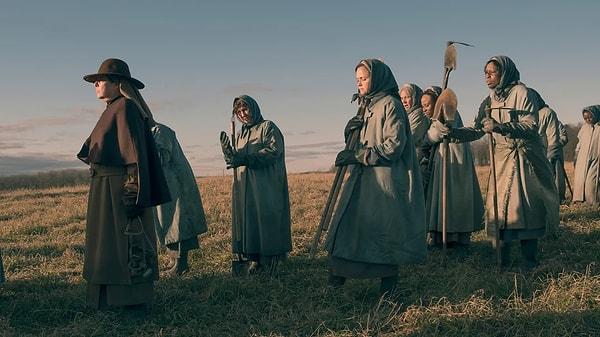
Courtesy of Hulu
Hannah performed clerical work in Ardua Hall for years while she read through the testaments, slowly coming to accept the reality of the country she loved. It wasn't shoved down her throat when she was least likely to accept it. It was a gradual, delicate process that came with its own set of caveats. She never came to consider herself a dissident or a nonbeliever. She knew that Gilead was rotting from within and that it was based on lies. She was fully conscious of those things, but she was still brainwashed. She couldn't separate herself from her loyalty. In fact, she held on to it, and she never fully lost it, even when she was finally allowed to cross back into Canada.
Her time in Gilead benefited her greatly. She learned patience and self-discipline, and she developed a meditative inner quiet, which would allow her to move seamlessly through her new surroundings. Her deprogramming gave her a healthy perspective, a sense of pragmatism, and a firm knowledge base, which shielded her from culture shock, and separated her from the resulting emotional turmoil many of her peers would experience if they were set free. She also learned to love her mother before she met her. Her brief flashes of memory had become a security blanket, and her time away--her suffering, her angst, and her torment--had made her more receptive to their inevitable meeting, bringing them closer. She craved that reunion, and when it did finally happen, she was ready.
This is how June and Hannah will find peace with one another. It will allow them to heal the rift between their two cultures and their two mindsets. It's not fair. It's uncomfortable for the audience. It shouldn't have to take that long, and she shouldn't have to work that hard to see the truth. But the series is realistic to a fault, and this is exactly what is required for her to have the skills and outlook she would need to survive. If she left before she was ready, her life would be a disaster. It was almost like somebody knew that and did everything they could to prepare her for what was to come.
Keşfet ile ziyaret ettiğin tüm kategorileri tek akışta gör!

Send Comment